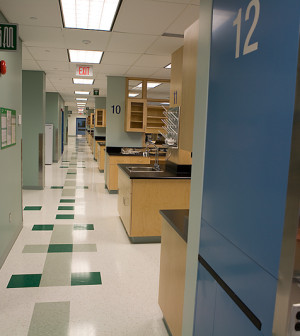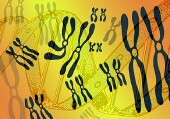- Could Artificial Sweeteners Be Aging the Brain Faster?
- Techniques for Soothing Your Nervous System
- Does the Water in Your House Smell Funny? Here’s Why
- Can a Daily Dose of Apple Cider Vinegar Actually Aid Weight Loss?
- 6 Health Beverages That Can Actually Spike Your Blood Sugar
- Treatment Options for Social Anxiety Disorder
- Understanding the Connection Between Anxiety and Depression
- How Daily Prunes Can Influence Cholesterol and Inflammation
- When to Take B12 for Better Absorption and Energy
- Epsom Salts: Health Benefits and Uses
Gene Testing Can Be Flawed, Study Finds


Gene tests that claim to predict your risk for certain diseases are often inaccurate, a large, new study finds.
Errors in testing or interpretation are serious, possibly leading to unneeded treatment or deterring someone from a life-saving therapy, according to the first report from a public-private consortium overseeing pooled gene data.
“In the past few years, it has become clear that many genetic variants that have been reported in the literature to cause disease have been misinterpreted,” said the authors of the study, published online May 27 in the New England Journal of Medicine and also released at a conference in Washington, D.C.
“The magnitude of this problem is bigger than most people thought,” one of the study’s authors, Michael Watson, executive director of the American College of Medical Genetics and Genomics, told the Associated Press.
Watson is a partner in a gene data-pooling project called ClinVar, which U.S. health officials helped form and fund a few years ago. The database contains confidential gene findings from more than 300 labs as well as private companies, according to the AP.
Of more than 80 million genetic variants known to exist, the group’s scientists have only tracked a fraction — about 172,000 variants in nearly 23,000 genes. Many of these variants influence the risk for a disease, and more than 10 percent have been analyzed by multiple labs in an attempt to compare results.
In 17 percent of the cases, the researchers said, results were interpreted differently at separate labs — either overstating the risk of disease, understating it or saying the gene variation had unknown significance or no significance. “At least one interpretation must be wrong and could therefore lead to inappropriate medical intervention,” the study authors wrote.
Doctors and online testing companies differ in their practices, the study authors discovered. “Patients need to choose labs that are sharing their data” with other investigators, study leader Heidi Rehm, genetics lab chief at Brigham and Women’s Hospital in Boston, told the AP. This is how scientists learn and improve their accuracy, she explained.
“Healthy competition among isolated entities is no longer sufficient to drive our understanding of human variation, and patient care may be compromised when data are not shared,” the study authors wrote.
More information
The U.S. National Human Genome Research Institute answers questions about genetic testing.
Source: HealthDay
Copyright © 2026 HealthDay. All rights reserved.










